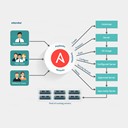Security improvements and usability enhancements for cloud and remotely hosted systems that can more securely unlock Network Bound Disk Encrypted devices at boot-time.
In a complex IT environment, even the smallest tasks can take forever. Sprawling systems are hard to develop, deploy, and maintain. Business demands only increase complexity, and IT teams struggle with management, availability, and cost. Ansible is simple, agentless IT automation technology that can improve your current processes, migrate applications for better optimization, and provide a single language for DevOps practices across your organization.
| Brand | Red Hat |
| Product Type | MANAGEMENT |
| Version | Red Hat Ansible Automation |
| Feature 01 | The speed of modern business means companies must deliver better products to market faster. But extended release cycles, error-prone releases, and unauthorized shadow IT make keeping up with market demands difficult. A robust platform to automate infrastructure and deployment pipelines, enact and enforce best practices, and take advantage of appropriate skills can support IT and help businesses overcome these challenges. |
| Feature 02 | Ansible by Red Hat® is a simple-to-use IT automation engine that transforms the repetitive, inefficient tasks of software release cycles into predictable, scalable, and simple processes. Ansible by Red Hat automates cloud provisioning, application deployment, configuration management, and service orchestration to let developers spend more time on their work and help operations more easily support deployment pipelines. Together, these capabilities create a quick, comprehensive, and coordinated approach to delivering business value. |
| Feature 03 | Ansible by Red Hat can provide organizations with an effective tool for IT automation, but the path to DevOps can be long and complex. Outdated habits must be replaced with more efficient practices, and new tools and processes require buy-in from various stakeholders across the organization. Additionally, groups must be enabled with the specific best practices for their work. |
| Feature 04 | Manual approaches to packaging and deploying workloads are naturally lengthy, error-prone, and difficult to maintain. Even in situations where automation has been used, any initial understanding between business, development, and operations fades quickly over time as resources move up or out of the team, documentation lags, and specialized technical skills dwindle. An appropriate IT automation strategy can enable teams to treat legacy like DevOps, predictably automating provisioning and deployment with tools that foster understanding and involvement across the organization. |
| Feature 05 | In areas where automation has been used, an array of tools and approaches lead to increasing chaos that prevents efficient operations and effective governance. Gaining understanding across business, development, and operations is difficult amidst a sea of scripting languages, automation tools, and ad hoc management solutions. Further, initial understanding fades quickly as team members are replaced, documentation lags, and the selected tools lose popularity or support. Standardizing on tooling, approach, monitoring, and management are crucial to delivering effective and efficient automation at enterprise levels. |
| Feature 06 | Establishing an intelligent approach to developing, deploying, and managing automation requires more than a reliable and understandable platform, it requires informed governance that ensures reliable operations and responds readily to new challenges. Teams must collaborate across traditional departmental boundaries to share their latest challenges and insights. |
In a complex IT environment, even the smallest tasks can take forever. Sprawling systems are hard to develop, deploy, and maintain. Business demands only increase complexity, and IT teams struggle with management, availability, and cost. Ansible is simple, agentless IT automation technology that can improve your current processes, migrate applications for better optimization, and provide a single language for DevOps practices across your organization.



